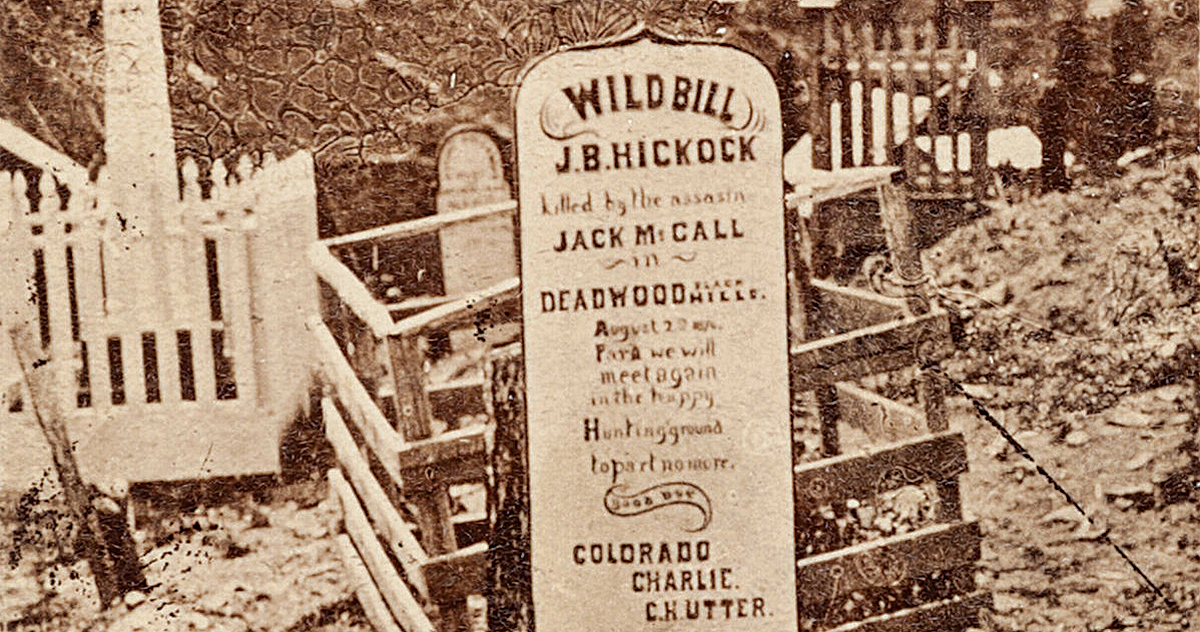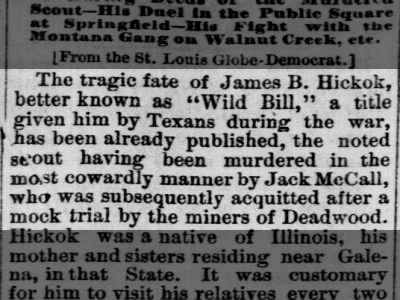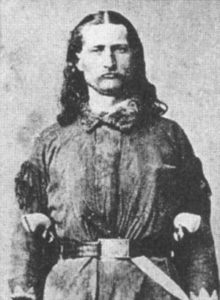How Old Was Wild Bill Hickok When He Died
Lenexa (pronounced /lɨnɛksə/) is a city in the central part of Johnson County, located in northeast Kansas, in the central United States of America. As of the 2010 census, the city population was 48,190. As a satellite city of Kansas City, Kansas, Lenexa is included in the Kansas City Metropolitan Area. It is bordered by the cities of Shawnee to the north, Overland Park to the east, De Soto to the west and Olathe to the south. In July 2009, Lenexa was named the #26 best small town to live in the United States by Money magazine.
Twelve years before the town of Lenexa was platted in 1869, a young man named James Butler Hickok staked a claim on 160 acres (0.65 km2) at what is now the corner of 83rd and Clare Road. At about the same time, a census of the Shawnee Indians living in the area was being taken. One of the residents was listed as 'Na-Nex-Se Blackhoof,' the widow of Chief Blackhoof, who was the second signer of the 1854 treaty that ceded 1.6 million acres (6,500 km²) of the Kansas Shawnee Indian reservation to the U.S.Government. A few miles east in Westport, Missouri, was the start of the Old Santa Fe Trail. It meandered through the southeast part of Lenexa on its way to Santa Fe, New Mexico. Life in eastern Kansas was about to change dramatically.
Later, Mr. Hickok became a scout for the Free-State Army, a sharpshooter and eventually, 'Wild Bill' Hickok, legendary lawman of the Old West. In 1865, shortly before Na-Nex-Se died, the Kansas and Neosho Valley Railroad was organized to take advantage of favorable new land laws. It later changed its name to Missouri River, Ft. Scott and Gulf Railroad and in 1869 purchased a right-of-way from C.A. Bradshaw with the stipulation that the railroad build a depot on the property. Mr. Bradshaw then sold 10.5 acres (42,000 m2) to Octave Chanute, a railroad civil engineer, who platted a town in 1869. Legend states that the town was first proposed to be named 'Bradshaw', but he modestly refused and the name 'Lenexa,' a derivation of the name Na-Nex-Se, was adopted.
- How Old Was Wild Bill Hickok When He Died
- How Wild Bill Hickok Died
- How Old Was Wild Bill Hickok
- How Old Was Wild Bill Hickok When He Died
One of the most legendary figures of the Old West, Wild Bill Hickok was an actor, gambler, lawman, and gunfighter who was regarded as one of the most skilled gunslingers of his day. Hickok got his start as a constable and rider for the Pony Express, but he gained a reputation for being handy with a gun after he killed outlaw David McCanles with. A gunfight between Hickok and David Tutt was likely the original source of the iconic one-on-one quickdraw concept. In 1876, Wild Bill was shot in the back during a game of poker. At the moment of his murder, he was holding two pairs of aces and eights, which later became known as the Dead Man’s Hand. Wild Bill Hickok – Old West Icon.
| Born | John McCall 1852/1853 |
|---|---|
| Died | (aged 24) Yankton, Dakota Territory |
| Cause of death | Death by hanging |
| Other names | Crooked Nose Jack; Broken Nose Jack |
| Known for | Murder of Wild Bill Hickok |
John “Jack” McCall (/məˈkɔːl/); (1852/1853 – March 1, 1877), also known as 'Crooked Nose' or 'Broken Nose Jack', was the murderer of Old West legend Wild Bill Hickok. McCall shot Hickok from behind as he played poker at Nuttal & Mann's Saloon in Deadwood, Dakota Territory on August 2, 1876. McCall was executed for the murder on March 1, 1877.
Early life[edit]
Many details of McCall's life are unknown. He was reportedly born in the early 1850s in Jefferson County, Kentucky.[1] McCall was raised in Kentucky with three sisters and eventually drifted west to become a buffalo hunter.[1][2] By 1876, he was living in a gold mining camp outside Deadwood, under the alias 'Bill Sutherland'.[1]
Murder of Hickok[edit]
McCall was intoxicated while drinking alcohol at Nuttal & Mann's saloon in Deadwood, South Dakota Territory, on August 1, 1876, when one of the players dropped out of a poker game that included 'Wild Bill' Hickok. The inebriated McCall quickly took his place. McCall proceeded to lose several hands, and was soon out of money. Hickok offered McCall money to buy breakfast and advised him not to play again until he could cover his losses. Though McCall accepted the money, he reportedly felt insulted.[1]
The following day on August 2, 1876, another poker game was taking place at the saloon. On this particular evening, Hickok had his back to the door, in contrast to his normal practice of sitting in a corner to protect his back. Among the players at the table (sitting in the corner) was Charles Rich, who refused Hickok's request to switch seats. Hickok reluctantly took the empty seat and joined the game, which was a fatal mistake. A drunken McCall entered the saloon, and ordered a drink from the bar. He proceeded to move down the bar, and stopped a few steps behind Hickok, as if to look at the hand he had been dealt. Not noticing McCall, Hickok said to another player, “The old duffer – he broke me on the hand,”, which would be his final words. McCall shot Hickok in the back of the head with a single-action .45-caliberrevolver, shouting 'Damn you! Take that!' Hickok died instantly. McCall ran out the back door of the saloon and tried to make his escape on a horse, but the saddle was loosened causing McCall to fall off. He was apprehended by several men shortly after.[3]
First trial[edit]
An impromptu court was called to order with the prosecution, defense, and jury made up of local miners and businessmen. On trial the next day in McDaniel's Theater, McCall claimed his actions were in retribution for Hickok having previously killed his brother in Abilene, Kansas.[4] McCall was found not guilty after two hours. The verdict brought the Black Hills Pioneer to editorialize: 'Should it ever be our misfortune to kill a man... we would simply ask that our trial may take place in some of the mining camps of these hills.'[4]
Second trial and execution[edit]

How Old Was Wild Bill Hickok When He Died


Fearing for his safety, McCall soon left the area and headed into Wyoming Territory, where he repeatedly bragged at local saloons about killing Hickok in a 'fair' gunfight.[1] But Wyoming authorities refused to recognize the result of McCall's acquittal on the grounds that the court in Deadwood had no legal jurisdiction. Because Deadwood was not under a legally constituted law enforcement or court system, officials argued that McCall could be tried for murder again. Agreeing, the federal court in Yankton, Dakota Territory, declared that double jeopardy did not apply, and set a date for a retrial.
The trial began on December 4, 1876. No witnesses were called for the defense, and the guilty verdict came in at 10:15 pm on December 6. McCall stated that he had been heavily intoxicated at the time of the murder and did not remember any details of the event. He requested a new trial, as well as claimed that his name was not really Jack McCall, and that he had changed it when he left home as a child. Judge Granville Bennett did not believe his story and sentenced McCall to death by hanging.
At 10:15 am on March 1, 1877, McCall was hanged in a public execution in Yankton, at age 24.[3]
Aftermath and legacy[edit]
McCall was buried in Sacred Heart Cemetery in Yankton County, South Dakota,[5] a cemetery which was moved in 1881. When McCall's body was exhumed, it was found to have the noose still around its neck.[1] McCall was the first person to be executed by federal officials in the Dakota Territory.[6]

The killing of Hickok and the capture of McCall is reenacted every summer evening (except Sundays) at the Masonic Temple in Deadwood.[7]
Portrayals[edit]

McCall has been played by:
- Porter Hall in the film The Plainsman (1936).[8]
- Lon Chaney, Jr. in the film Badlands of Dakota (1941).[9]
- George Montgomery in the film Jack McCall, Desperado (1953).[10]
- David Arquette in the film Wild Bill (1995).[11]
- John Pyper-Ferguson in the 1995 television series Legend.
- Garret Dillahunt in the 2004 HBO television series Deadwood.[12]
See also[edit]
References[edit]
How Wild Bill Hickok Died
- ^ abcdef'Jack McCall – The Coward That Killed Wild Bill Hickok'. Legends of America. Retrieved June 30, 2012.
- ^Buffalo hunters; Legends of America online; accessed November 2016
- ^ abJack McCall - The Murder of Wild Bill Hickok
- ^ abBlack Hills Daily Pioneer Press; Sheldon, C. H.; August 5, 1876.
- ^Zimny, Michael (12 February 2016). 'The Trial of Wild Bill's Killer... the 'Dirty Puppy' That Beat a Murder Rap... 146 Years of History at a 125 Year Old Yankton Hotel'. South Dakota Public Broadcasting. Retrieved 19 August 2018.
- ^Henry, Mike (18 March 2014). What They Didn't Teach You in American History Class. R&L Education. p. 92. ISBN9781475808476.
- ^'Shoot Outs - Main Street Deadwood Historic Street Shows'. Deadwood. Archived from the original on 20 August 2017. Retrieved 10 June 2012.
- ^Rainey, Buck (21 November 2012). Western Gunslingers in Fact and on Film: Hollywood's Famous Lawmen and Outlaws. McFarland Publishing. p. 186. ISBN9781476603285.
- ^Svehla, Gary (21 January 2018). Midnight Marquee Actors Series: Lon Chaney, Jr. Midnight Marquee & BearManor Media. p. 232.
- ^Hilger, Michael (16 October 2015). Native Americans in the Movies: Portrayals from Silent Films to the Present. Rowman & Littlefield. p. 198. ISBN9781442240025.
- ^Wilmington, Michael (1 December 1995). 'Modernist 'Wild Bill' Is Good, But Misses Greatness'. Chicago Tribune. Retrieved 19 August 2018.
- ^Fish, Andrew (3 April 2013). 'Raising Hope 's Garret Dillahunt Reflects on Deadwood , Any Day Now , and the Importance of Keeping It Different'. Huffington Post. Oath Inc. Retrieved 19 August 2018.
External links[edit]
How Old Was Wild Bill Hickok
- Jack McCall at Find a Grave